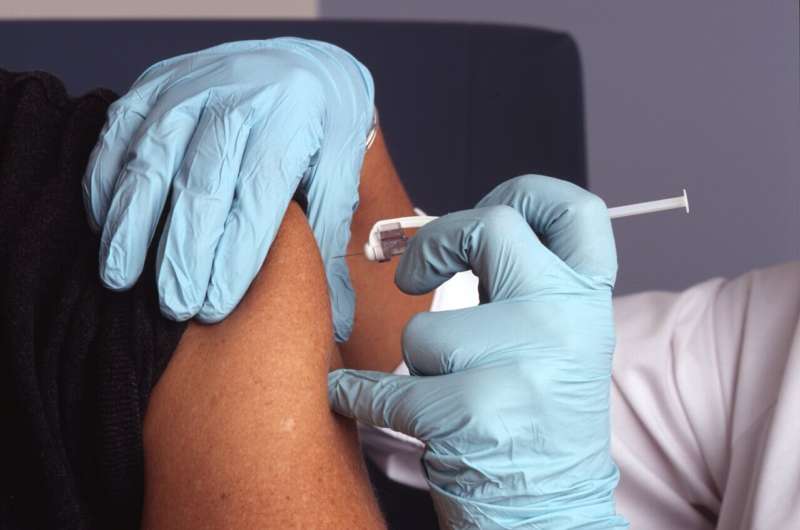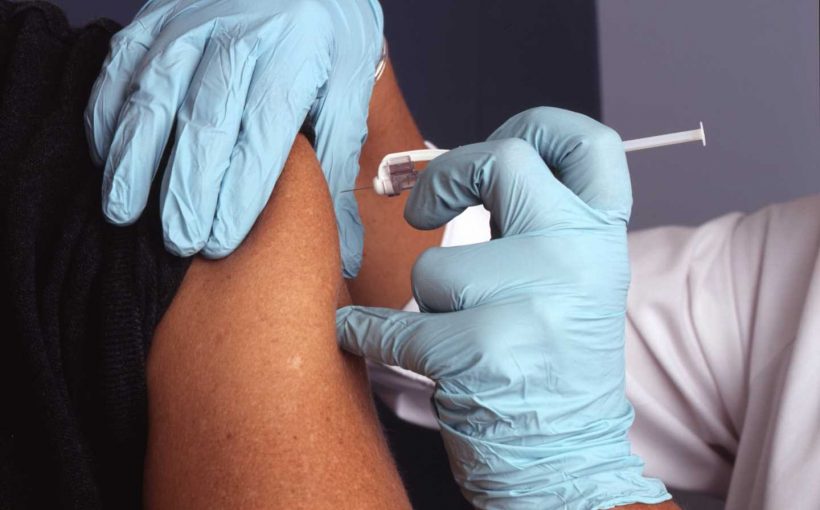
The wide inequalities in COVID-19 vaccine uptake between people from ethnic minority groups and White British people are far greater than for the pre-pandemic flu jab, a study by University of Manchester health researchers has found.
The findings, published in PLOS Medicine, overturns the prevailing view that ethnic inequalities in COVID-19 vaccine uptake simply follow previous trends in people’s willingness to take up vaccination.
Instead, the researchers suggest, the COVID-19 vaccination program has created additional and different inequalities beyond pre-existing inequalities in vaccine uptake.
Adjusting for age and clinical vulnerability, people from Arab, mixed White and Black African, mixed White and Black Caribbean, and all Black or Black British backgrounds were less than half as likely to take up COVID-19 vaccination compared to the White British group.
Inequalities in COVID-19 vaccine uptake were at least double the size of flu vaccine inequalities for almost half (7/16) of ethnic minority groups.
Differences between the two types of vaccine were particularly stark for those from a Bangladeshi background.
After adjusting for age and clinical vulnerability, people belonging to the Bangladeshi group were almost 10% more likely to have taken up flu vaccination, yet over 40% less likely to have taken up the COVID-19 vaccine, compared to the White British group.
Most worryingly, ethnic inequalities were highest amongst people at the highest risk of severe COVID-19—older and more clinically vulnerable people, and those living in the most income-deprived areas.
The researchers examined 752,715 people eligible for the COVID-19 vaccine between December 2020 and April 2021, and the flu vaccine between September 2019 and March 2020.
“We found ethnic inequalities in COVID-19 vaccine uptake are far wider than those seen previously for seasonal Influenza vaccine, and exist even among those recently vaccinated against Influenza,” said lead author Dr. Ruth Watkinson from The University of Manchester.
“Further research and community engagement is needed to build trust and confidence amongst minority ethnic communities, and to better understand and remove barriers to vaccine access.”
Online public discussion groups with diverse members of the Greater Manchester community identified themes which could explain the inequalities.
Stephanie Gillibrand, another Manchester researcher involved in the study said: “Existing mistrust stemming from racism, experiences of culturally insensitive healthcare, and awareness of previous unethical healthcare research were all themes raised in discussion groups.
“Concerns about potential unknown side-effects of COVID-19 vaccines compared to existing vaccines may have been heightened among people from minority ethnic groups due to their underrepresentation in COVID-19 vaccine clinical trials.
“Additional research is required to further explore the complex social, political and structural drivers and barriers to vaccine uptake which drive these statistics, as highlighted by our public engagement work”
Nicolas Filer, a public contributor involved in the study said: “Especially interesting was the clear exposure of differences in vaccine uptake within different ethnic minority groups and communities within the broader widely used classifications.
“Once the more special needs of some of our community were recognized and responded to by the NHS, their vaccine take up was greatly increased.”
Dr. Watkinson added: “Even for healthcare services provided free at the point of use, disadvantaged populations with the greatest ‘need’ for care tend to have lower uptake of services.
“Residential segregation driven by systemic racism may have resulted in barriers—in terms of journey time and cost—to accessing large centralized vaccination sites for some communities.
“However, local solutions such as vaccine pop ups and local centers have now expanded vaccine access across Greater Manchester. These innovations, alongside providing culturally-sensitive vaccination options, are crucial for equitable access.”
Issues around racism were raised in the discussion groups. Some people from ethnic minority backgrounds reported difficulties booking and traveling to vaccination appointments, as well as a lack of official vaccine information translated into additional languages.
Source: Read Full Article
